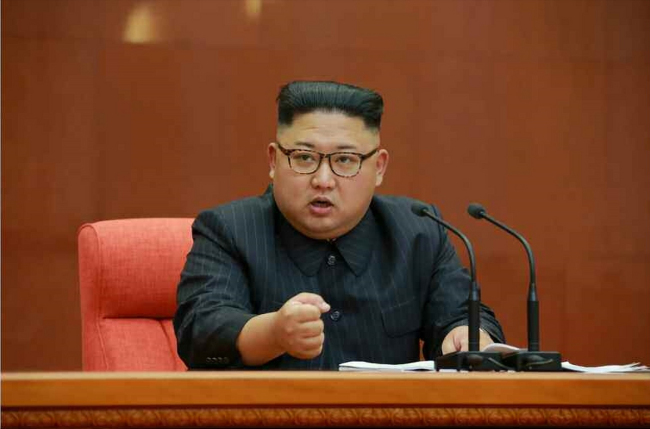‘Kim Jong-un takes situation seriously’
Recent personnel reshuffle reflects will to overcome isolation, sanctions
By Jung Min-kyungPublished : Oct. 9, 2017 - 17:16
North Korea’s recent large-scale personnel reshuffle appears to be an effort to deal with and navigate the current situation, Seoul’s Unification Ministry said.
“Kim Jong-un is taking the current situation seriously and the personnel reshuffle is a way to overcome that,” it said in a report released Sunday.
“Kim Jong-un is taking the current situation seriously and the personnel reshuffle is a way to overcome that,” it said in a report released Sunday.

The personnel changes were announced Sunday, shortly after a meeting of Pyongyang’s Central Committee of the ruling Workers’ Party. At the meeting, Kim Jong-un reportedly called the nation’s nuclear weapons a “powerful deterrent,” which guarantees his regime’s sovereignty and is a measure to counter the US’ “protracted nuclear threats.”
The ministry report explained that the promotion of key officials including North Korean Foreign Minister Ri Yong-ho is a move to show the reclusive regime’s will to break through its diplomatic isolation in the international community on the back of its own diplomatic and economic figures. Ri will serve as a full vote-carrying member of the politburo, the top decision-making body of North Korea headed by its current strongman.
Experts here highlight that the timing of the meeting came amid the international society’s tightening sanctions against the North following its sixth nuclear test on Sept. 3. The experiment triggered the United Nations Security Council to impose a ban on North Korea’s lucrative textile exports and a chain reaction among the international community to cut off diplomatic and economic ties with the rogue regime.
“The reason why North Korea suddenly hosted the meeting is because it felt threatened by the international community’s unprecedentedly tough sanctions, following its sixth nuclear experiment in September,” said Chung Sung-jang, director of unification strategy studies at the Sejong Institute.
“UNSC Resolution 2375 is bound to cause great damage to North Korea’s economy since it aims to cut 30 percent of the North’s petroleum imports, ban textile exports and pull out North Korean firms in China,” he added.
“In order for North Korea to overcome (this isolation), it needs to cut back on its economic reliance on other foreign nations, especially China.”
During the meeting, the North Korean leader also upheld the country’s policy of “parallel development” of nuclear weapons and the economy, calling it “absolutely right.”
Kim Jong-sik and Ri Pyong-chol, two of the three men behind North Korea’s nuclear missile development program, were also promoted.
“Ri Pyong-chol and key figures involved in the nuclear and missile development program were promoted to join North Korea’s core leadership. … To showcase the regime’s will to continue on with parallel policy,’” Du Hyeogn Cha, a visiting scholar at Seoul’s Asan Institute for Policy Studies, said in an interview with YTN on Monday.
Kim Jong-un also elevated his sister Kim Yo-jong, presumed to be 28 years old, to an alternate member of the politburo. This makes her the only millennial member of the body other than Kim Jong-un.
Cha interpreted this as a final step to consolidate Kim Jong-un’s family power after he expelled his uncle Jang Song-thaek from the North’s core leadership and later executed him on charges of treason.
“In a short-term perspective, there won’t be any opposing forces that will likely challenge Kim Jong-un within two to three years,” he said.
By Jung Min-kyung (mkjung@heraldcorp.com)



















![[Today’s K-pop] Treasure to publish magazine for debut anniversary](http://res.heraldm.com/phpwas/restmb_idxmake.php?idx=642&simg=/content/image/2024/07/26/20240726050551_0.jpg&u=)